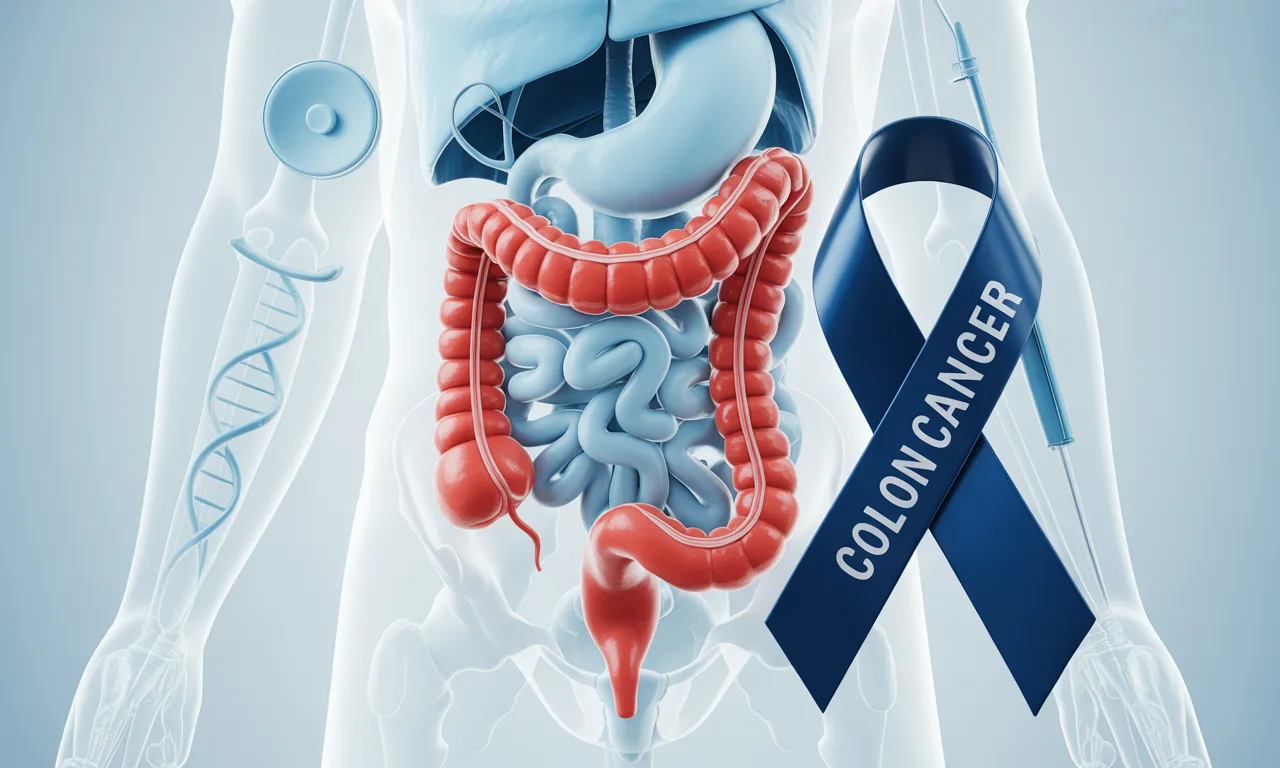Colon cancer, often grouped with rectal cancer as colorectal cancer, is becoming one of the most alarming health concerns worldwide. According to the International Agency for Research on Cancer (IARC), about 1.9 million people are diagnosed each year, and more than 900,000 lose their lives to this disease annually. That makes it the third most common cancer globally and the second leading cause of cancer-related deaths.
But what’s even more concerning? Colon cancer is no longer just an “older person’s disease.” Cases in people under 50 have been rising steadily for the past 20–30 years, and experts are urging early screenings and increased awareness.
In this blog, we’ll explain what colon cancer is, its symptoms, causes, testing options, treatment—and what you can do now to stay one step ahead.
💡 What Is Colon? Understanding the Colon’s Role in Your Body
Let’s start with the basics. What is colon? Also known as the large intestine, the colon plays a crucial role in your digestive system. It absorbs water and nutrients from digested food and removes waste through the rectum.
So, when we talk about colon meaning, we’re referring to this essential part of your gastrointestinal tract—a common site for intestinal disorders and the primary location where colon cancer begins.
⚠️ Colon Cancer Symptoms: Know the Warning Signs
One reason colon cancer can be so dangerous is that it often begins without obvious symptoms. However, recognizing the early warning signs of cancer can lead to earlier diagnosis and a much better outcome.
🔍 Common Symptoms of Colon Cancer Include:
- Blood in the stool or colon cancer stool appearing dark or tarry
- Ongoing constipation or diarrhea
- Persistent abdominal pain, bloating, or cramps
- Unexplained weight loss
- Fatigue and weakness
- A feeling that the bowel doesn’t empty completely
These can easily be mistaken for other intestinal disorders like IBS or Crohn’s disease, so it’s essential not to ignore them—especially if they last longer than a few weeks.
🧬 Cause of Colon Cancer: What Increases Your Risk?
The cause of colon cancer is often a combination of genetic and lifestyle factors. Here’s what research shows increases your risk:
- Family history of colorectal cancer
- Diets high in red or processed meats and low in fiber
- Sedentary lifestyle
- Smoking and heavy alcohol use
- Obesity
- Chronic intestinal disorders like ulcerative colitis or Crohn’s
- Type 2 diabetes
- Aging (though younger adults are increasingly at risk too)
Understanding the colon cancer cause can help you take preventive steps before symptoms appear.
🧪 Colon Cancer Test: Early Detection Saves Lives
Catching colon cancer early dramatically improves your chances of survival. If you’re over 45—or younger with a family history—you should talk to your doctor about getting tested.
✅ Common Colon Cancer Tests Include:
- Colonoscopy – the most accurate test, also removes polyps
- Stool tests – detect hidden blood or DNA mutations
- CT colonography – a non-invasive imaging test
- Biopsy – for analyzing suspicious tissue samples
If you’re asking, “When should I get a colon cancer test?” — the answer is: as early as possible if you’re at risk.
💊 Colon Cancer Treatment: What Are the Options?
If diagnosed, colon cancer treatment will depend on the stage and location of the cancer. Common treatments include:
- Surgery – to remove tumors or part of the colon
- Chemotherapy – often used after surgery or for advanced stages
- Radiation therapy – particularly effective in rectal cancers
- Targeted therapy & immunotherapy – for certain genetic or late-stage cancers
The key to effective treatment is early diagnosis—which is why testing is so important.
📈 The New Reality: Colon Cancer in Young Adults
What’s driving global concern is the increase in colon cancer among people under 50. Experts believe poor diets, sedentary lifestyles, environmental factors, and lack of early screenings are contributing.
If you’re under 50 and experiencing symptoms—or have a family history—don’t wait. You may need screening earlier than the general population.
🧬 Advanced Genetic Testing from DNA Labs India
Looking to stay one step ahead of colon cancer? DNA Labs India offers an advanced solution: the Colon Cancer Comprehensive Panel (NGS Genetic DNA Test).
This test uses Next-Generation Sequencing (NGS) to detect inherited mutations that may lead to colon cancer. It’s ideal for:
- Individuals with a family history of colon or colorectal cancer
- People who want to understand their genetic risk
- Patients looking to customize their screening and prevention plans
🔗 Learn more or book your test here:
👉 Colon Cancer Genetic Test – DNA Labs India
✅ Conclusion: Don’t Wait for Symptoms—Take Action Today
Colon cancer is preventable, treatable, and beatable—but only if it’s caught early. Whether you’re over 45 or under 50 with risk factors, taking steps today could save your life tomorrow.
- Know the symptoms of colon cancer
- Understand your colon cancer cause
- Get the right colon cancer test
- Explore colon cancer treatment options if needed
- And most importantly—don’t ignore your gut



